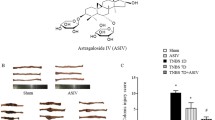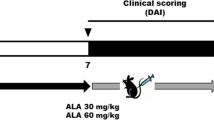Abstract
PURPOSE: The aim of this study was to investigate the role of I-glutamine, short chain fatty acid, prednisolone, and mesalazine (5-aminosalicylic acid) enemas on mucosal damage and inflammation in experimental colitis. METHODS: Colitis was induced in rats with trinitrobenzene sulfonic acid in ethanol. Saline (n=14), prednisolone (n=13), 5-aminosalicylic acid (n=14), I-glutamine (n=14), and short chain fatty acid (n=13) enemas were applied twice daily to the rats for seven days after the induction of colitis. The sham group (n=9) received only saline enemas. Rats were killed at the seventh day and their colonic macroscopic inflammatory scores were determined. Colonic mucosal gamma glutamyl transpeptidase activity and colonic mucosal malondialdehyde levels were measured. The same measurements but no enemas were done in the control group (n=7). RESULTS: There were significant differences in macroscopic inflammatory scores between sham and colitis groups (P<0.001). The macroscopic inflammatory scores of the colitis group were higher than the short chain fatty acid and glutamine groups (P<0.05). Whereas the mucosal gamma glutamyl transpeptidase activity was diminished in prednisolone, 5-aminosalicylic acid, and short chain fatty acid groups when compared with the control group; in the colitis, sham, and glutamine groups the activity of this enzyme did not change. The mucosal malondialdehyde levels were significantly lower in the prednisolone and glutamine groups than in the colitis group. CONCLUSION: Only one of four agents tested, namely, I-glutamine enemas, could decrease the severity of colitis both morphologically and biochemically. Moreover, L-glutamine prevented the colitis-induced oxidant injury in the colonic mucosa. On the other hand, prednisolone and short chain fatty acids seemed to improve only the physiologic changes of colitis.
Similar content being viewed by others
References
Roediger WE. The colonic epithelium in ulcerative colitis: an energy-deficiency disease? Lancet 1980;4:712–5.
Evans MA, Shronts EP. Intestinal fuels: glutamine, short chain fatty acids, and dietary fiber. J Am Diet Assoc 1992;92:1239–46.
Cummings JH. Short chain fatty acids in the human colon. Gut 1981;22:763–79.
Mortensen FV, Hessov I, Birke H, Korsgoard N, Nielsen H. Micro-circulatory and trophic effects of short chain fatty acids in the human rectum after Hartman's procedure. Br J Surg 1991;78:1208–11.
Ambroze WL Jr, Pemberton JH, Phillips SF, Bell AM, Haddad AC. Fecal short-chain fatty acid concentrations and effect on ileal pouch function. Dis Colon Rectum 1993;36:235–9.
Senagore AJ, MacKeigan JM, Scheider M, Ebrom JS. Short-chain fatty acid enemas: a cost-effective alternative in the treatment of nonspecific proctosigmoiditis. Dis Colon Rectum 1992;35:923–7.
Friedel D, Levine GM. Effect of short chain fatty acids on colonic function and structure. JPEN 1992;16:1–4.
Breuer RI, Buto SK, Christ ML,et al. Rectal irrigation with short chain fatty acids for distal ulcerative colitis. Dig Dis Sci 1991;36:185–7.
Steinhart AH, Brzezinsky A, Baker JP. Treatment of refractory proctosigmoiditis with butyrate enemas. Am J Gastroenterol 1994;89:179–83.
Scheppach W, Sommer H, Kirchner T,et al. Effect of butyrate enemas on the colonic mucosa in distal ulcerative colitis. Gastroenterology 1992;103:51–6.
Hartmann F, Plauth M. Intestinal glutamine metabolism. Metabolism 1989;38(Suppl 8):18–24.
Fujita T, Sakurai K. Efficacy of glutamine-enriched enteral nutrition in an experimental model of mucosal ulcerative colitis. Br J Surg 1995;82:749–51.
Harris ML, Schiller HJ, Reilly PM, Donowitz M, Grisham MB, Bulkley GB. Free radicals and other reactive oxygen metabolites in inflammatory bowel disease: cause, consequence or epiphenomenon? Pharmacol Ther 1992;53:375–408.
Simmonds NJ, Rampton DS. Inflammatory bowel disease—a radical view. Gut 1993;34:865–8.
Salim AS. Role of oxygen-derived free radical scavengers in the management of recurrent attacks of ulcerative colitis: a new approach. J Lab Clin Med 1992;19:710–7.
Babbs CF. Oxygen radicals in ulcerative colitis. Free Radic Biol Med 1992;13:169–81.
Nakamura K, Sugai T, Kinoshita N, Scato M, Taniguchi S, Kawase S. Effect of mesalazine, an agent for treatment of idiopathic inflammatory bowel disease, on reactive oxygen metabolites and LTB4 formation. Nippon Yakurigaku Zasshi 1994;104:447–57.
Wallace JL, Mac Naughton WK, Morris GP, Beck PL. Inhibition of leucotriene synthesis markedly accelerates healing in rat model of inflammatory bowel disease. Gastroenterology 1989;96:29–36.
Vilaseca J, Salas A, Guarner F, Rodinguez R, Martinez M, Malagelada JR. Dietary fish oil reduces progression of chronic inflammatory lesions in rat model of granulomatous colitis. Gut 1990;31:539–44.
Rosalki SB, Rau D, Lehmann D, Prentice M. Determination of serum gamma glutamyl transpeptidase activity and its clinical applications. Ann Biol Chem 1970;7:143–46.
Rosalki SB. Gamma glutamyl transpeptidase. Adv Clin Chem 1975;17:53–107.
Ohkava H, Ohihi N, Yagi K. Assay for lipid peroxides in animals tissues by thiobarbituric acid reaction. Anal Biochem 1979;95:351–8.
Lowry GH, Roselbrough NJ, Farr AL, Randall RJ. Protein measurement with the folin reagent. J Biol Chem 1951;193:265–75.
Morris GP, Beck PL, Herridge MS, Depew WT, Szewczuk MR, Wallace JL. Hapten-induced model of chronic inflammation and ulceration in the rat colon. Gastroenterology 1989;96:795–803.
Grisham MB, Wolkmer C, Tso P, Yamada T. Metabolism of trinitrobenzene sulphonic acid by the rat colon produces oxygen species. Gastroenterology 1991;101:540–7.
Gardiner KR, Anderson NH, McCaigue MD, Erwin PJ, Halliday MI, Rowlands BJ. Adsorbents as antiendotoxin agents in experimental colitis. Gut 1993;34:51–5.
Gardiner KR, Anderson NH, Rowlands BJ, Barbul A. Colitis and colonic mucosal barrier dysfunction. Gut 1995;37:530–5.
Salman T, Güvenç H, Koçer H,et al. Fetal intestinal transplantation: use of immunosuppressive agent syngenetic hosts. Pediatr Surg 1989 3:94–9:
Bengmark S, Jeppson B. Gastrointestinal surface protection and mucosa reconditioning. JPEN 1995;19:410–5.
De Meyts ER, Chang MS, Robison CT, Groffers J, Heisterkamp N, Forman H. Transfection with gamma glutamyl transpeptidase enhances recovery from glutathione depletion using extracellular glutathione. Toxicol Appl Pharmacol 1992;114:56–62.
Steacker JL, Sattler CA, Pitot HC. Sodium butyrate preserves aspects of the differentiated phenotype of normal adult rat hepatocytes culture. J Cell Physiol 1988;135:367–76.
Hertz F, Cloarec A. Pharmacology of free radicals: recent views on their relation to inflammatory mechanisms. Life Sci 1984;34:713–20.
Sharon P, Stenson WF. Metabolism of arachidonic acid in acetic acid colitis in rats. Gastroenterology 1985;88:55–63.
Burakoff R, Zhao L, Joseph I, Koo H, Rosenfeld W. SOD prevents colitis and attenuates eicosanoid release and motility changes in a trinitrobenzene sulphonic acid rabbit colitis [abstract]. Gastroenterology 1991;100:A565.
Ondrula D, Nelson RL, Andrianopoulos G,et al. Quantitative determination of pentane in exhaled air correlates with colonic inflammation in the rat colitis model. Dis Colon Rectum 1993;36:457–62.
Karmeli F, Eliakim R, Okon E, Samuni A, Rachmilweitz D. A stable nitroxide radical effectively decreased mucosal damage in experimental colitis. Gut 1995;37:386–93.
Bhaskar L, Ramakrishma BS, Balasubrammanian KA. Colonic mucosal antioxidant enzyme and lipid peroxide levels in normal subjects and patients with ulcerative colitis. J Gastroenterol Hepatol 1995;10:208–29.
Donowitz M. Arachidonic acid metabolites and their role in inflammatory bowel disease. Gastroenterology 1985;88:530–7.
Zijlstra FJ, Van Dijk JP, Wilson JH. Increased platelet activating factor synthesis in experimental colitis after diclofenac and 5-amino-salicylic acid. Eur J Pharmacol 1993;249:R1–2.
Nielsen OH, Bouchelouche PN, Berild D, Ronne IA. Effect of 5-aminosalicylic acid and analogue substances on superoxide generation and intracellular free calcium in human neutrophilic granulocytes. Scand J Gastroenterol 1993;28:527–32.
Sutherland LR, Martin F, Greer S,et al. 5-aminosalicyclic acid enema in the treatment of distal ulcerative colitis, proctosigmoiditis and pouchitis. Gastroenterology 1987;92:1894–8.
Roediger WE. Utilisation of nutrients by isolated epithelial cells of the rat colon. Gastroenterology 1982;83:424–9.
Scheppach W, Bartram P, Richter A,et al. Effect of short chain fatty acids on the human colonic mucosa in vitro. JPEN 1992;16:43–8.
Mortensen FV, Nielsen H, Mulvany MJ, Hessov I. Short chain fatty acids dilate isolated human colonic resistance arteries. Gut 1990;31:1391–9.
Cummings JH, Pomare EW, Branch WJ, Naylor CP, Macfarlane GT. Short chain fatty acids in human large intestine, portal, hepatic and venous blood. Gut 1987;28:1221–7.
Frankel WL, Zhang W, Singh A,et al. Mediation of the trophic effects of short-chain fatty acids on the rat jejunum and colon. Gastroenterology 1994;106:375–80.
Grimble G. Fibre, fermentation, flora and flatus. Gut 1989;30:6–13.
Chapman MA, Grahn MF, Boyle MA, Hutton M, Rogers J, Williams NS. Butyrate oxidation is impaired in the colonic mucosa of sufferers of quiescent ulcerative colitis. Gut 1994;35:73–6.
Chapman MA, Grahn MF, Hutton M, Willams NS. Butyrate metabolism in the terminal ileal mucosa of patients with ulcerative colitis. Br J Surg 1995;82:36–8.
Finnie IA, Taylor BA, Rhodes JM. Ileal and colonic epithelial metabolism in quiescent ulcerative colitis: increased glutamine metabolism in distal colon but no defect in butyrate metabolism. Gut 1993;34:1552–6.
Finnie IA, Dwarakanath AD, Taylor BA, Rhodes JM. Colonic mucin synthesis is increased by sodium butyrate. Gut 1995;36:93–9.
Rombeau JL, Kripke SA. Metabolic and intestinal effect of short chain fatty acids. JPEN 1990;14(Suppl):S181–5.
Breuger RI, Soergel KH, Lashner BA,et al. Short chain fatty acid rectal irrigation for left-sided ulcerative colitis: a randomised, placebo controlled trial. Gut 1997;40:485–91.
Ko TC, Beauchimp RD, Townsend CM, Thompson JC. Glutamine is essential for epidermal growth factor-stimulated intestinal cell proliferation. Surgery 1993;114:147–54.
Hong RW, Rounds JD, Helton WS, Robinson MK, Wilmore DW. Glutamine preserves liver glutathione after lethal hepatic injury. Ann Surg 1992;215:114–9.
Author information
Authors and Affiliations
Additional information
Supported by The Scientific and Technical Research Council of Turkey.
About this article
Cite this article
Kaya, E., Gür, E.S., Özgüç, H. et al. L-glutamine enemas attenuate mucosal injury in experimental colitis. Dis Colon Rectum 42, 1209–1215 (1999). https://doi.org/10.1007/BF02238577
Issue Date:
DOI: https://doi.org/10.1007/BF02238577




